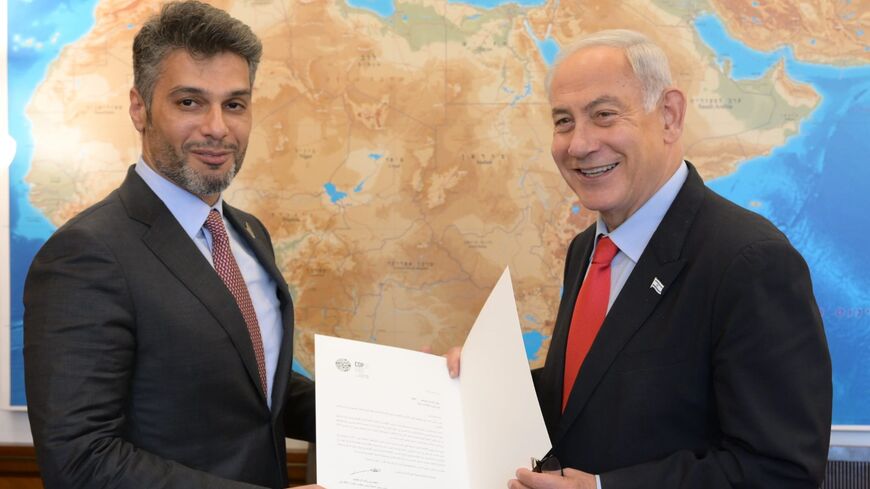Prime Minister Benjamin Netanyahu received on Monday a formal invitation to visit the United Arab Emirates (UAE) for the November COP28 climate summit, amid months of delays in securing a first official trip to the Gulf country.
UAE’s Ambassador to Israel Mohamed Al Khaja handed in person the invitation to Netanyahu, at the premier’s office in Jerusalem. A similar invitation was also extended by the ambassador to Israel’s President Isaac Herzog. It is not clear yet whether it will be Netanyahu or Herzog to lead the Israeli delegation to the conference.
Netanyahu has never made an official visit to UAE despite Abu Dhabi agreeing to normalize relations with Israel in 2020. Netanyahu’s predecessors, Naftali Bennett, Yair Lapid visited the UAE, so did Herzog.
Tensions with the Palestinians, and Netanyahu’s far-right government have delayed such trip and a one-on-one meeting for the Israeli prime minister with UAE leader Sheikh Mohammed bin Zayed. It is unclear if the invite to COP28 will include a bilateral meeting with Sheikh Mohammed.
But the visit if it happens is a culmination of two years of failed Netanyahu attempts to land in Abu Dhabi.
On March 2021, six months after the signing of Abraham Accords in Washington, Netanyahu was set to depart for a first public visit of an Israeli premier to the Emirates, but his trip got canceled after Amman delayed authorization for his plane to pass via Jordanian airspace. With elections in Israel set for a few days only after the canceled trip, Netanyahu had no time to reschedule the visit.
During his 2022 election campaign, Netanyahu expressed his desire for the Emirates to be his first destination abroad if and when reelected premier. Shortly after his election victory, Netanyahu’s office announced he was planning to travel to Abu Dhabi, but the Emirates canceled the visit after National Security Minister Itamar Ben-Gvir ascended the Temple Mount. The Times of Israel cited at the time an unnamed Arab diplomat, who claimed that the visit of Ben-Gvir to the Temple Mount was not the only reason for the delay and that the UAE feared Netanyahu would use the visit in the country to publicly threaten Iran, at a time when Abu Dhabi was trying to ease tensions with Tehran.
However, Yedioth Ahronoth newspaper reported in September 2020 that Netanyahu flew to the United Arab Emirates in 2018 for a secret meeting with then the crown prince of the of Abu Dhabi, Sheikh Mohammed bin Zayed.
As prime minister, Bennett visited the Emirates twice — first in December 2021 and then in June 2022. He also visited the country two months ago, as former prime minister, meeting again with Nahyan and also meeting a number of senior economic officials. Herzog visited the Emirates last December, traveling to Abu Dhabi from Manama, Bahrain, in a double-historic visit by an Israeli president.
As such, while viewed as a sign of goodwill on the part of Abu Dhabi, the invitation for Netanyahu to participate at the climate summit is still a far cry from an official visit to the country. Together with Egypt, Jordan, Qatar, the Palestinians, France and the United States, the Emirates strongly condemned the visit of far-right Israeli minister Itamar Ben-Gvir last Sunday to the Temple Mount, adding to tensions between Israel and the UAE. Also, representing the Arab League at the UN Security Council, the Emirates had initiated in the past few weeks a series of pro-Palestinian resolution proposals, including the initiative to ask the International Criminal Court in The Hague for an opinion report on the continuation of West Bank occupation.
That being said, Netanyahu had spoken on the phone twice with the Emirati leader since taking office. Nahyan had called Netanyahu in January to congratulate him after the swearing-in of his new government. The two leaders again spoke on the phone last April to exchange good wishes for Ramadan and Passover.
Furthermore, Israel and the UAE activated last March a major economic partnership agreement. A May 15 report by Al-Monitor signaled that since the signing of the Abraham Accords, Israel has seen a rapid expansion of merchandise trade with several countries in the region, led by the UAE, Egypt and Turkey.








